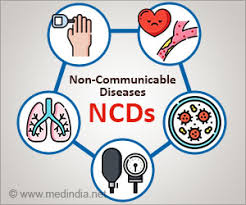
Countdown to 2025: How European Nations Are Winning the Fight Against Noncommunicable Diseases
As the world prepares for the Fourth High-level Meeting of the UN General Assembly on the Prevention and Control of Noncommunicable Diseases (NCDs) in September 2025, recent data from the World Health Organization (WHO) paints an encouraging picture. Countries like Denmark, Estonia, Norway, and Sweden have made notable strides in reducing premature mortality from NCDs such as cardiovascular diseases, cancer, diabetes, and chronic respiratory illnesses. But what key policies have driven this success?
While there’s no universal solution for every country, a number of shared strategies have emerged as effective tools for combating NCDs. The European Union’s Joint Action Prevent Non-Communicable Diseases (JA-PreventNCD) and Joint Action Cardiovascular Diseases and Diabetes (JACARDI), in partnership with WHO/Europe, are at the forefront of identifying these policy actions. Together, they are working to understand the success factors in countries that have effectively addressed NCD threats while strengthening their health monitoring systems.
New Data on NCD Progress
At a pivotal event on September 10, 2024, titled "Strengthening NCD Monitoring Systems in the EU: A Collaborative Approach," experts presented fresh data on countries' achievements in meeting regional and global NCD targets. Dr. Knut-Inge Klepp, Scientific Coordinator of JA-PreventNCD, highlighted the importance of tailoring evidence-based practices to each country’s specific needs. “Knowledge and data are crucial,” he said. “When policymakers understand their country’s NCD trajectory—its strengths and weaknesses—they can take focused action for improvement.”
The event emphasized the importance of dialogue between countries and creating a platform for transparency, fostering collaboration across WHO’s European Member States. This data-driven approach is vital, as NCDs continue to pose the biggest health threat across the Region.
The Urgent Need for Action on NCDs
Noncommunicable diseases are responsible for 90% of deaths in Europe, with cardiovascular disease, cancer, diabetes, and chronic respiratory illnesses taking a staggering toll. According to WHO statistics, these conditions claim 8.2 million lives annually in the Region, with 2.3 million of those deaths considered premature, occurring before the age of 70.
However, there is hope on the horizon. WHO data shows that well-targeted, evidence-based policy actions, such as the organization’s recommended "Quick buy" interventions, can significantly reduce NCD-related mortality and disability. Prevention is key: it’s about empowering individuals to make healthier choices and shielding them from known risk factors, including tobacco use, alcohol consumption, poor diet, and insufficient physical activity.
Key Policy Levers: A Focus on Taxation and Advertising
One of the most effective approaches across the Region has been WHO’s “Quick buy” policies, which offer time- and cost-effective measures for governments to implement. Among the most impactful of these actions are increasing taxes on tobacco, alcohol, and unhealthy foods, as well as banning the advertising and sponsorship of these products.
By making unhealthy choices less attractive and more expensive, these policies create an environment where healthier options become the default. This shift is crucial to driving down the burden of NCDs and creating societies where good health is more accessible to all.
Investing in Data and Surveillance
Monitoring progress and maintaining robust surveillance systems is another essential element in the fight against NCDs. “Robust data and surveillance systems are crucial for identifying and addressing risks,” explained Dr. Gauden Galea, Strategic Adviser to the WHO Regional Director for Europe. “By monitoring progress at both the country and regional levels, we can tailor our strategies to meet each nation’s unique challenges.”
Countries like Denmark, Estonia, Norway, and Sweden are leading the way by utilizing these strategies and systems effectively. WHO/Europe is now conducting an in-depth analysis to identify the patterns and characteristics that have allowed these countries to reduce premature mortality from NCDs.
A Collective Effort Towards Better Health
The path to reducing NCDs requires more than just commitment—it demands action and collaboration. Dr. Benedetta Armocida, Coordinator of JACARDI, emphasized the importance of turning data into actionable insights. “Advancing NCD monitoring is about advancing justice and equity in health,” she said. “We need every Member State and community to commit to a future where everyone has the opportunity to live their healthiest life possible.”
As the world prepares for the UN’s high-level meeting in 2025, every country has the opportunity to step up efforts to reduce NCD-related deaths. By implementing evidence-based policies and investing in robust data systems, nations can create healthier environments, leading to longer, better-quality lives for their populations.
The battle against NCDs is ongoing, but with the right tools, strategies, and collective will, countries across the Region can continue to make significant progress.